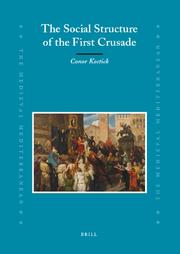| Listing 1 - 2 of 2 |
Sort by
|

ISSN: 09285520 ISBN: 9789047445029 9047445023 9789004166653 9004166653 1282398458 9781282398450 9786612398452 6612398450 Year: 2008 Volume: v. 76 Publisher: Leiden Brill
Abstract | Keywords | Export | Availability | Bookmark
 Loading...
Loading...Choose an application
- Reference Manager
- EndNote
- RefWorks (Direct export to RefWorks)
The First Crusade (1096 – 1099) was an extraordinary undertaking. Because the repercussions of that expedition have rippled on down the centuries, there has been an enormous literature on the subject. Yet, unlike so many other areas of medieval history, until now the First Crusade has failed to attract the attention of historians interested in social dynamics. This book is the first to examine the sociology of the sources in order to provide a detailed analysis of the various social classes which participated in the expedition and the tensions between them. In doing so, it offers a fresh approach to the many debates surrounding the subject of the First Crusade.
Crusades --- Civilization, Medieval. --- Social classes --- Croisades --- Civilisation médiévale --- Classes sociales --- History --- Histoire --- Christian church history --- anno 1000-1099 --- anno 1100-1199 --- Civilization, Medieval --- Barons' Crusade, 1096-1099 --- First Crusade, 1096-1099 --- Princes' Crusade, 1096-1099 --- Medieval civilization --- Middle Ages --- Civilization --- Chivalry --- Renaissance --- Class distinction --- Classes, Social --- Rank --- Caste --- Estates (Social orders) --- Social status --- Class consciousness --- Classism --- Social stratification --- Kreuzzug <1096-1099> --- Sozialstruktur. --- Crusades - First, 1096-1099 --- Social classes - Europe - History - To 1500 --- Medieval History History --- Antioch --- Bohemond I of Antioch --- First Crusade --- Gesta Francorum --- Jerusalem --- Raymond of Aguilers
Book
ISBN: 0691656339 0691197644 Year: 1977 Publisher: Princeton, New Jersey : Princeton University Press,
Abstract | Keywords | Export | Availability | Bookmark
 Loading...
Loading...Choose an application
- Reference Manager
- EndNote
- RefWorks (Direct export to RefWorks)
Though conditioned by the specific circumstances of eleventh-century Europe, the launching of the crusades presupposed a long historical evolution of the idea of Christian knighthood and holy war. Carl Erdmann developed this argument first in 1935 in a book that is still recognized as basic to an understanding of how the crusades came about. This first edition in English includes notes supplementing those of the German text, a foreword discussing subsequent scholarship, and an amplified bibliography. Paying special attention to the symbolism of banners as well as to literary evidence, the author traces the changes that moved the Western church away from its initial aversion to armed combat and toward acceptance and encouragement of the kind of holy war that the crusades would represent: a war whose specific cause was religion. Erdmann's analysis stresses the role of church reformers and Gregory VII, without neglecting the "popular" idea of crusade that would assure an astonishingly enthusiastic response to Urban II's appeal in 1095. His book provides an unrivaled account of he interaction of the church with war and warriors during the early Middle Ages. Carl Erdmann (1898-1945) taught at the University of Berlin and was associated with the Monumenta Germania historica. Marshall Baldwin was Professor Emeritus of History at New York University at his death in 1975. Walter Goffart is Professor of History at the University of Toronto. Originally published in 1978.The Princeton Legacy Library uses the latest print-on-demand technology to again make available previously out-of-print books from the distinguished backlist of Princeton University Press. These editions preserve the original texts of these important books while presenting them in durable paperback and hardcover editions. The goal of the Princeton Legacy Library is to vastly increase access to the rich scholarly heritage found in the thousands of books published by Princeton University Press since its founding in 1905.
Admonition. --- Adviser. --- Advocacy group. --- Advocacy. --- Allegory. --- Allusion. --- Amidei. --- Amiens. --- Anselm of Lucca. --- Archdeacon. --- Ark of the Covenant. --- Battle of Graus. --- Benedict of Nursia. --- Bernold. --- Bertran de Born. --- Canon law (Catholic Church). --- Canon law. --- Carroccio. --- Christendom. --- Christian ethics. --- Christian state. --- Christianity. --- Christianization. --- Church of the Holy Sepulchre. --- Clergy. --- Colonization. --- Consecration. --- Counterattack. --- Crusades. --- Doctrine. --- Donation of Constantine. --- Donatism. --- Ecclesiology. --- Emblem. --- Epistle. --- Erlembald. --- Expansionism. --- Fief. --- First Crusade. --- Geoffrey (archbishop of York). --- Gesta Francorum. --- God. --- Hagiography. --- Haud. --- Holy city. --- Hymn. --- Indulgence. --- Infidel. --- Investiture. --- Ivo of Chartres. --- Kingdom of Jerusalem. --- Knight. --- Knights Hospitaller. --- Labarum. --- Liber. --- Literature. --- Mercenary. --- Military service. --- Missionary. --- Monte (Funchal). --- Monte Cassino. --- Moors. --- Muhammad. --- National god. --- Nobility. --- Normans. --- Paganism. --- Pamphlet. --- Papal States. --- Papal legate. --- Pataria. --- Persecution. --- Polemic. --- Pontificate. --- Pope. --- Promulgation. --- Rapprochement. --- Raymond of Aguilers. --- Religious coercion. --- Religious order. --- Religious orientation. --- Religious symbol. --- Righteousness. --- Robert Guiscard. --- S. (Dorst novel). --- Saracen. --- Sermon. --- Servant of God. --- Sigebert of Gembloux. --- Simony. --- Slavs. --- Southern Italy. --- Synod. --- Temporal power (papal). --- The Monastery. --- The Word of the Lord. --- Theodor Heuss. --- Vassal. --- Veneration. --- War.
| Listing 1 - 2 of 2 |
Sort by
|

 Search
Search Feedback
Feedback About UniCat
About UniCat  Help
Help News
News